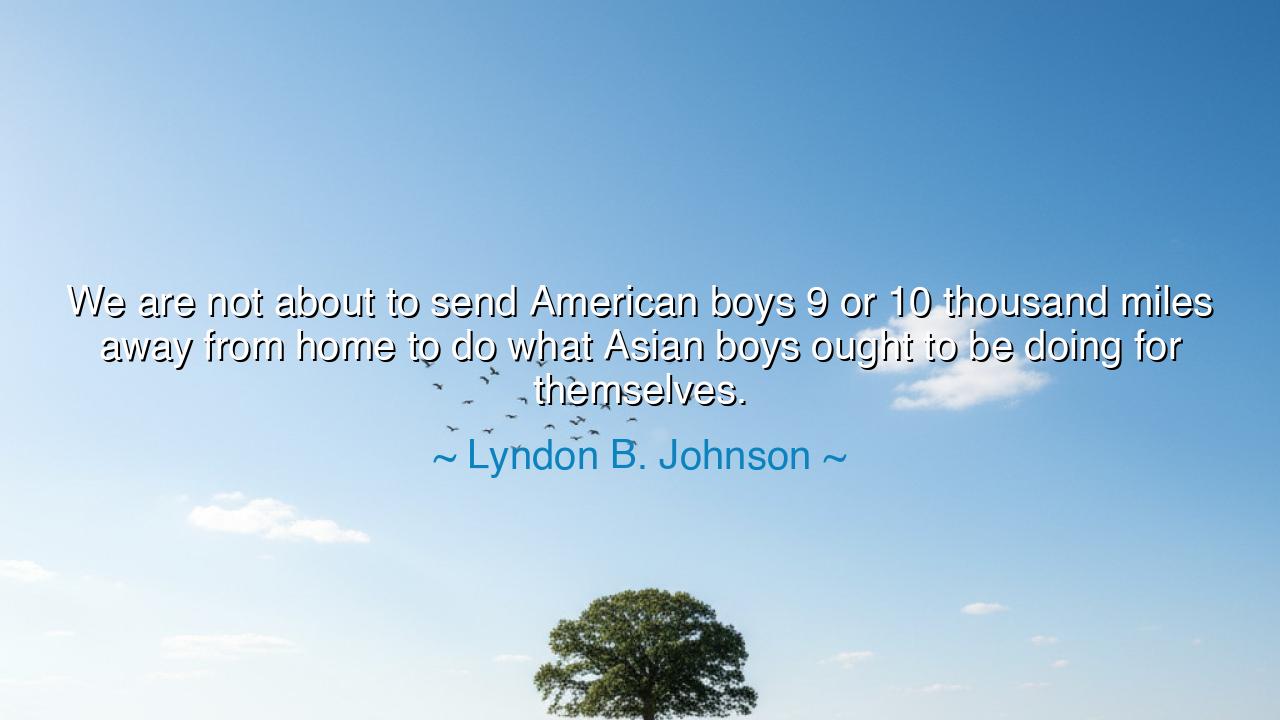
We are not about to send American boys 9 or 10 thousand miles
We are not about to send American boys 9 or 10 thousand miles away from home to do what Asian boys ought to be doing for themselves.






"We are not about to send American boys 9 or 10 thousand miles away from home to do what Asian boys ought to be doing for themselves." — thus declared President Lyndon B. Johnson in 1964, a year before the United States plunged headlong into the inferno of the Vietnam War. His words, meant to calm a restless public, have echoed through the corridors of history with bitter irony. They speak of a leader torn between ideals and inevitability, of the eternal tension between intention and action, between the promise of restraint and the pull of destiny.
In its meaning, this quote stands as both a declaration and a lament. Johnson sought to assure the American people that the sons of their nation would not be sacrificed in distant lands for a struggle that was not their own. He wished to project prudence — to frame America’s role as one of guidance, not domination. Yet beneath his words trembled the weight of uncertainty. For even as he spoke of staying home, forces beyond his control — political pressure, fear of communism’s spread, and the shadow of past wars — were already pushing him toward the very decision he claimed to resist. Thus, this statement reveals the ancient conflict between duty and desire, between what a man wishes to do and what the tide of circumstance compels him to do.
The origin of these words lies in the turbulent dawn of the Vietnam era. In 1964, the United States stood at a crossroads. The memory of World War II and the Korean conflict still lingered, and the specter of communist expansion haunted Western minds. Yet the American people were weary of war. Johnson, newly in power after Kennedy’s death, faced the monumental task of balancing strength with restraint. His declaration — that Asian men should defend their own lands — was a promise of modesty, a refusal of empire. But within a year, under the Gulf of Tonkin Resolution, that promise gave way to escalation, and hundreds of thousands of “American boys” were indeed sent across the ocean.
Here lies the tragedy of leadership: that a man may speak truthfully of his intentions, yet find his hands bound by history. Johnson, like the kings and generals of old, faced the burden of realpolitik, where moral clarity often dissolves beneath the storms of consequence. His quote, when viewed from the later years of war, becomes not an act of deceit, but a mirror of human frailty — the reminder that even the powerful cannot always escape the contradictions of their time.
There are echoes of this struggle in ancient tales. When King Agamemnon led his armies to Troy, he did not do so out of personal malice, but because the web of alliances and oaths bound him to action. Like Johnson, he hesitated before unleashing war, knowing that each decision would stain his soul. Yet history demands of its leaders not purity, but choice. And in choosing, they inherit both glory and guilt. Johnson’s words, therefore, remind us that even the loftiest leaders are but men caught in the gears of history’s machine.
The lesson for future generations is this: beware the ease with which noble words can harden into unintended deeds. Resolve, if unguarded by wisdom, becomes momentum; and momentum, once set in motion, becomes war. In the same way, in our personal lives, we may speak of peace while walking toward conflict, promising restraint even as pride and fear lead us astray. The path to ruin often begins with the assurance of safety.
So, let this be your reflection: to act with clarity, and to mean fully what you say. Whether in governance or in the quiet choices of life, let your intentions be grounded not in fear or appearance, but in understanding. For it is better to walk humbly within one’s limits than to be swept away by forces one claimed to control.
And when you speak — whether to the world or to your own heart — remember the weight of your words. For as Lyndon B. Johnson’s quote teaches, the distance between promise and consequence may be as long as ten thousand miles, and the cost of crossing it may be measured not only in lives, but in the sorrow of a conscience that meant only to do right.






AAdministratorAdministrator
Welcome, honored guests. Please leave a comment, we will respond soon